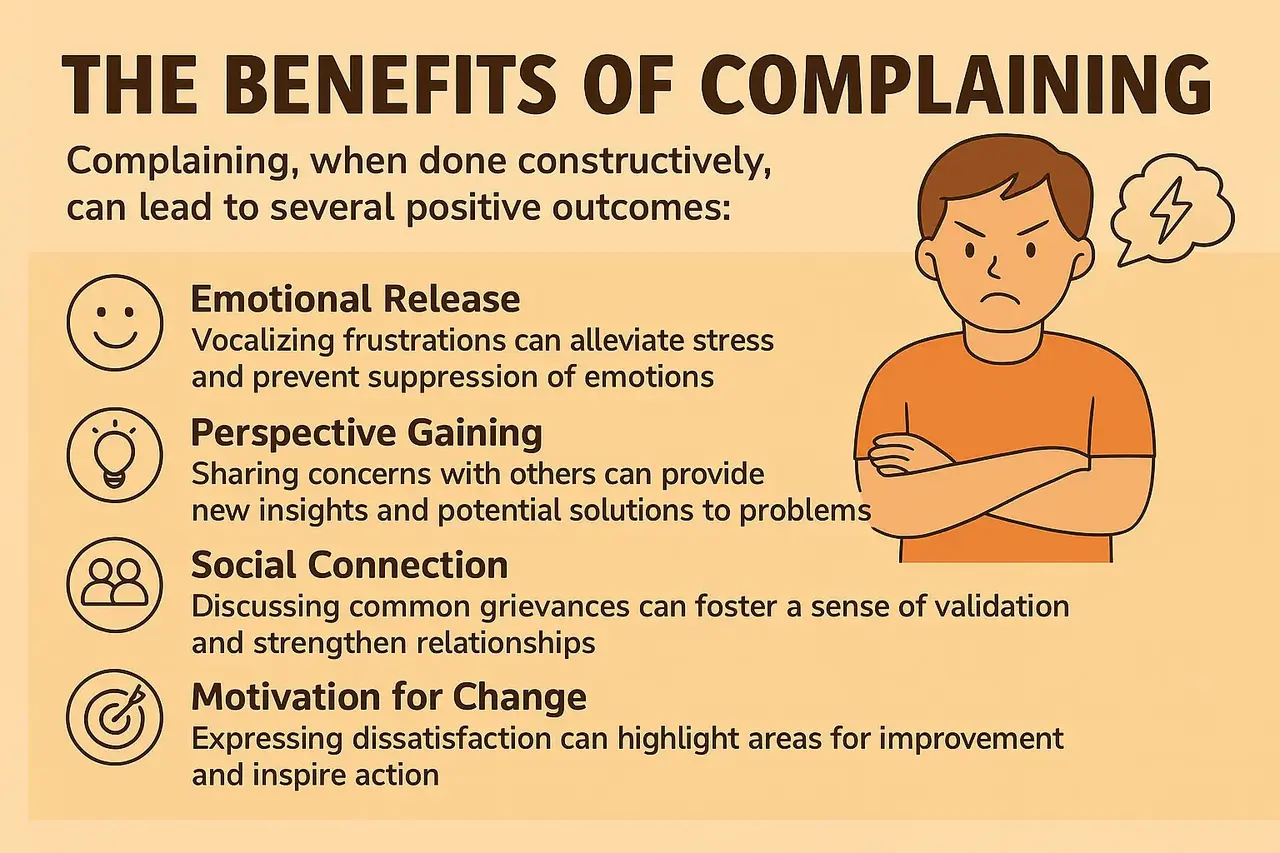Healthy Complaining: Turning Venting into a Solution

The coffee is cold. The meeting ran late. The traffic is gridlocked. We all feel the urge to vent frustrations from time to time. But while constant negativity can be toxic, suppressing your emotions isn’t the answer either.
There is a middle ground known as healthy complaining.
Unlike habitual venting, which keeps you stuck in a loop of negativity, healthy complaining is a purposeful tool for emotional regulation. It allows you to express dissatisfaction to release stress, feel understood, and move toward a solution.
When approached correctly, it doesn’t just make you feel better; it prevents small annoyances from snowballing into burnout.
This guide explores the neuroscience behind why we vent and provides actionable frameworks to ensure your complaints lead to connection and change, rather than conflict.
Key Takeaways
The Psychology Behind Complaining
Our propensity to voice dissatisfaction is not merely a modern phenomenon; it is rooted in evolutionary biology and serves several core psychological functions. Complaining is a form of communication with both benefits and costs.
It is prevalent in our culture despite often being viewed negatively.
Evolutionary Perspective
The human brain is naturally biased towards negativity, a trait developed for survival. Our ancestors relied on identifying potential threats and challenges in their surroundings to feel safe.
This negativity bias means we are more attuned to potential problems than to positives, a mechanism that once increased our chances of survival. This inherent focus on negatives can explain why complaining is such a widespread behavior.
Our need to express discontent has molded human survival and social cooperation throughout history.

Emotional Regulation
Complaining often serves as an emotional discharge, offering relief from the effects of emotional repression. Suppressing emotions is harmful to well-being, leading to depressive symptoms, fatigue, and low self-esteem.
Expressing pain, discomfort, or grievances verbally can reduce stress and provide a temporary sense of catharsis. This initial relief is a primary motivator for complaining and plays a role in its persistence.
The brain may even tag complaints as helpful because they vent tension and win validation, creating a habit loop.
What is Healthy Complaining? (vs. Toxic Venting)
Understanding the difference between venting for relief and venting for toxicity is crucial. Use this guide to reframe your language.
| Scenario | 🛑 Toxic Complaining (Unconstructive) | ✅ Healthy Complaining (Constructive) | Why It Works |
| Traffic / Commute | “This traffic is terrible; I always get stuck in it, and it ruins my whole day.” | “This traffic today made me late, and I feel frustrated. I need to leave 15 minutes earlier tomorrow to avoid this delay.” | Shifts focus from a helpless generalization (“always”) to a specific event and an actionable plan. |
| Work / Boss | “My boss never appreciates anything I do. It is so unfair.” | “I feel undervalued on this project because my contributions weren’t acknowledged. I need to schedule a meeting to discuss my role.” | Uses “I feel” language instead of attacking character. Proposes a solution rather than assuming victimhood. |
| Relationships / Chores | “You are so lazy. You never help around the house!” | “I feel overwhelmed when the kitchen is messy after I cook. I need you to handle the dishes tonight so we can relax.” | Avoids “You” statements which trigger defensiveness. Clearly states the need rather than just the grievance. |
| General Life | “Why does this always happen to me? Nothing ever goes right.” | “This situation is really difficult right now. I’m going to vent for 5 minutes, and then I want to figure out my next move.” | Avoids “You” statements, which trigger defensiveness. Clearly states the need rather than just the grievance. |
The Benefits of Constructive Complaining
When complaints are delivered with purpose and mindfulness, they can become a force for positive change and personal growth. This is known as constructive complaining, distinct from mere grumbling.
1. Emotional Release and Stress Reduction
A primary benefit of well-managed complaining is the release of pent-up frustrations and emotions. Letting out a negative experience feels better than keeping it in, providing immediate relief and reducing stress.
This emotional release can also boost self-esteem and relationship satisfaction when feelings are communicated effectively. Even small acts of emotional articulation can biologically reduce stress and help people respond with more clarity.
2. Facilitating Problem-Solving and Gaining Perspective
Complaining, when channeled strategically, can activate the prefrontal cortex, the brain region responsible for planning, decision-making, and problem-solving.
This cognitive engagement moves individuals away from impulsive reactions towards more logical steps. Our experience suggests that articulating a problem aloud can clarify thoughts and help identify actionable solutions.
Sharing complaints with others can elicit support and new perspectives. Trusted individuals can offer insights that help break patterns of ruminative or catastrophic thinking.
This external input can illuminate pathways forward that might not have been apparent when dwelling on the issue alone. In business, a focus on complaints can even help solve problems through an “inversion method,” turning negatives into positive steps for improvement.
3. Catalyst for Positive Change
Complaining can serve as a motivator for change. The discomfort of anger or frustration stemming from a situation can compel an individual to address the root cause.
For example, expressing dissatisfaction with a workplace policy might inspire improvements if communicated effectively. Instrumental complaining, which is goal-oriented and seeks to bring about change, is a powerful form of this.
It builds on the problem area rather than destroying it, offering suggestions for improvement. learn more about effective workplace communication strategies.
4. Fostering Connection and Empathy
Voicing grievances can foster a sense of validation and connection between individuals. When someone acknowledges another’s pain and validates their experience, it creates a bond and feels good.
This commiseration can strengthen relationships by creating a temporary sense of shared understanding. From our observations, sharing frustrations appropriately can deepen empathy and mutual support, acting as a buffer against stress.

Recognizing the Signs of Excessive Complaining
While constructive complaining has its place, *excessive, unconstructive complaining* can be detrimental to mental health, relationships, and even brain function. It becomes problematic when it is habitual, lacks solutions, and creates a negative feedback loop.
Impact on Personal Well-being
Chronic complaining reinforces negative thought patterns, leading to increased stress, anxiety, and feelings of helplessness. This constant negativity can make individuals more prone to depressive thought patterns, overshadowing positives.
It can also weaken the immune system by triggering the release of cortisol, the stress hormone, and increasing the risk of various illnesses. Studies suggest that daily complaining correlates with intrusive thoughts, rumination, low self-esteem, and mental fatigue.
Negative Social Repercussions
Spending excessive time complaining can drain the energy of those around you and strain relationships. Loved ones may feel burdened, leading to emotional disconnection or conflict.
When friends perceive that nothing changes despite repeated discussions of problems, they may withdraw, reinforcing a cycle of negativity and victimhood.
Chronic complainers often find themselves socially isolated because their persistent negativity can repel others. learn more about fostering healthy relationships.
Subscribe to Create Higher Vibrations!
Get Inspiration and Practical advice straight to your inbox.
Additional Signs you complain too much can include:
Your Brain on Complaints: The Science of Neuroplasticity
You might think complaining is just letting off steam, but your brain perceives it as practice.
The human brain is highly adaptable, constantly reorganizing itself based on your thoughts and behaviors. This process is called neuroplasticity. While this adaptability helps us learn new skills, it also has a downside when applied to chronic negativity.
“Neurons That Fire Together, Wire Together”
This famous principle of neuroscience (Hebbian theory) explains why complaining can become addictive.
Every time you complain, your neurons branch out to bridge the gap to other neurons, easing the flow of information. The more you trigger this negative thought pattern, the stronger and faster these connections become.
Think of it like walking through a field of tall grass. The first time is difficult. But if you walk the same path every day, you tramp down the grass and create a smooth trail. Eventually, it becomes the easiest path to take.
The Physical Cost: Shrinking the Hippocampus
The impact isn’t just functional; it is structural. Research suggests that chronic complaining and the resulting stress response release cortisol (the stress hormone).
Elevated cortisol levels can be toxic to the hippocampus, the part of the brain responsible for problem-solving and memory. Studies have shown that long-term exposure to high stress and negativity can actually shrink this vital area, impairing your ability to think clearly or form new memories, symptoms often seen in cognitive decline.
The Good News: You Can Rewire It Back
The same mechanism that wires your brain for complaints can be used to rewire it for healthy complaining and gratitude.
By consciously stopping a negative thought and forcing yourself to identify a solution or a positive aspect (Strategy #3), you weaken the negative connection and start building a new, positive neural pathway.

Strategies for Healthy Complaining (The “How-To”)
The goal is not to eliminate complaining entirely, but to engage in it *constructively*. This means directing dissatisfaction towards *actionable outcomes* and managing its frequency and context.
4 Strategies to Master Healthy Complaining
The goal isn’t to silence yourself; it’s to complain with intent. Use these four strategies to ensure your venting leads to relief or resolution, rather than just more stress.
1. The “Purpose Check” Before You Speak
Before you voice a grievance, pause for ten seconds and identify your goal. Healthy complaining requires knowing why you are speaking up. Ask yourself:
If you cannot identify the purpose, you are likely just spiraling. Wait until you can.
2. The 5-Minute “Container” Rule
Unstructured complaining rewires the brain for negativity. To prevent this, place a strict boundary around your venting sessions.
3. Use the XYZ Formula (The Script)
When addressing a conflict with someone else, vague complaints trigger defensiveness. Instead, use this specific script to keep the conversation safe and productive:
“I feel [X]… because of [Y]… and I need [Z].”
Why it works: It separates the person from the behavior, focusing on your needs rather than their character flaws.
4. The “Vent Buddy” Protocol
Choose your audience wisely. Dumping negativity on a coworker or partner who is already stressed can damage the relationship. Instead, establish a “Vent Buddy”—someone you trust who agrees to hear you out.
Crucial Step: Ask for consent before you start.
This simple question respects the listener’s boundaries and ensures they are actually present to support you.
Alternative Approaches to Managing Discontent
Beyond direct complaining, other strategies can help manage frustrations constructively:

Frequently Asked Questions
Is complaining inherently bad?
No, complaining is not inherently bad. Occasional complaining is a normal part of the human experience and can serve useful functions like emotional release and problem identification. The key is to complain constructively and in moderation.
Can complaining make you feel better?
Yes, complaining can make you feel better, especially when it provides an emotional release or validation. However, this relief is often temporary. If complaining becomes habitual or lacks a solution-oriented focus, it can lead to chronic negativity and worsen mood over time.
What are the signs that you complain too much?
Signs you complain too much include consistently focusing on negative experiences, rarely offering solutions to problems, engaging in repetitive complaints, having a victim mentality, noticing that others avoid you, and frequently needing to reassure people you are simply “realistic”.
Why do people complain so much?
People complain for various reasons, including seeking emotional release, validation, and social connection.
It can also stem from an inherent negativity bias in the brain, a learned coping mechanism for stress, or underlying mental health conditions like anxiety or depression. Sometimes it is a subconscious attempt to control or manipulate situations or others.
Does complaining make you feel better?
Complaining can provide *short-term relief* by discharging negative emotions and helping you feel heard. This psychological benefit is tied to the cathartic experience.
However, if complaints do not lead to problem-solving or become habitual, they can reinforce negative moods and reduce overall happiness.
Examples of complaining:
Discover Your Inner Self. Join Our Self-Mastery Program.
Self-Mastery Coaching gives you the space, tools, and guidance to grow, reflect and discover your values and inner strength.

Bottom Line
Complaining is a complex human trait with both potential benefits and significant risks. While the urge to vent is a natural response to discomfort and can provide valuable emotional release, foster social connection, and even initiate problem-solving, its effectiveness hinges on its intentionality and moderation.
Unchecked, habitual complaining can lead to a detrimental cycle of negativity, physically rewiring the brain, and isolating individuals.
By understanding the underlying psychology of complaining and applying structured, constructive communication techniques, we can transform expressions of dissatisfaction into opportunities for personal growth and positive change.
The path to well-being involves recognizing when to voice grievances purposefully and when to seek alternative strategies for managing discontent.


